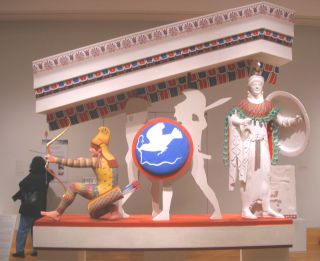November 25, 2007
War Isn't Pretty

The official count is in -- only two representatives (Kucinich and Paul) voted against charging "Iranian President Mahmoud Ahmadinejad with violating the 1948 Convention on the Prevention and Punishment of the Crime of Genocide and the United Nations Charter because of his calls for the destruction of the State of Israel", thereby declaring Iran an official enemy and potential target for the offenses of our reckless, greedy administration.
With over 6200 suicides among returning veterans, 28,000 wounded and maimed, an unprecedented number of cases of PTSD due to multiple deployments, and possibly 150,000 soldiers with traumatic brain injury, the grim consequences of this war (to our own troops alone) should be sufficient motivation to end it rather than escalate it. What's wrong with our elected officials ?
Elizabeth Samet has written a book, "Soldier's Heart" about her ten years of teaching literature at West Point. It was reviewed recently in the New York Times by poet Robert Pinsky. In her course she examines the many facets of honor as it is taught at the Academy:
Like love and art, honor comes from the imagination as a force that determines the fate of individuals and nations. And like love and art, honor has also attracted a thick enveloping tonnage of baloney, an encrustation of lies and exploitations. The lies and exploitations, in turn, have attracted debunking counterforces: the acids of doubt and the harsh illumination of exposure. A literature teacher at the academy deals with the imaginative forces of lofty aspiration and earthly truth-telling in an especially germane, intensified community — all the more so in a time of war.:
Pinsky goes on to quote Samet quoting Tim O'Brien's novel "The Things They Carried" (phew):
“A true war story is never moral. It does not instruct, nor encourage virtue, nor suggest proper models of human behavior, nor restrain men from doing the things men have always done. If a story seems moral, do not believe it. If at the end of a war story you feel uplifted, or if you feel that some small bit of rectitude has been salvaged from the larger waste, then you have been made the victim of a very old and terrible lie.”O’Brien echoes the concluding lines of Owen’s “Dulce et Decorum Est,” with its title from Horace and its description of a soldier who was so exhausted he failed to get his gas mask on in time:
If in some smothering dreams you too could pace
Behind the wagon that we flung him in,
And watch the white eyes writhing in his face,
His hanging face, like a devil’s sick of sin;
If you could hear, at every jolt, the blood
Come gargling from the froth-corrupted lungs,
Obscene as cancer, bitter as the cud
Of vile, incurable sores on innocent tongues, —
My friend, you would not tell with such high zest
To children ardent for some desperate glory,
The old Lie: Dulce et decorum est
Pro patria mori.Playwright and Iraq war veteran Joshua Casteel explains "How I Became a Conscientious Objector"
Enough is enough.
Photo note: This is a shot from from the exhibit "Gods In Color at the Sackler Museum, in which ancient statues were analyzed for long lost pigment and repainted accordingly. It seems that Ancient Greece and Rome tended toward the garish. I signed an 800 word waiver, which was much too long to read, promising not to do anything with my photos -- I'm assuming they meant for profit. Let me make it clear that you can read the above entry for free.
Posted by Dakota at November 25, 2007 09:26 AM